The Future Dreams of Ireland’s Youth: Possibilities for Rural Regeneration and Generational Renewal
Introduction
In this blog post we take a look at some research that was conducted in Ireland that aimed to identify how Ireland could improve regeneration of its rural areas using youth.
The decline of youth in rural areas poses a significant challenge, contributing to ageing populations and reduced economic vitality. In Ireland, this issue is particularly pressing. Addressing it requires a focus on rural regeneration and generational renewal, encouraging young people to engage in farming and rural activities to sustain and revitalise rural communities.
Influences on Rural Youth Livelihoods and Lifestyles
One of the main reasons young people leave rural areas is the lack of suitable educational and employment opportunities. Studies indicate that access to jobs that match their skills and education significantly influences their decision to stay or leave. For instance, in the UK, the availability of employment is a key factor in retaining rural youth. Similarly, in the Alpine Mountain region, suitable job opportunities are crucial for young people deciding whether to stay, leave, or return.
Beyond employment, factors such as quality of life, access to amenities, and strong community ties play a critical role in rural youth retention. Young people aspire to a balanced lifestyle that includes work, leisure, and family life, influencing their decisions about where to live.
Methodology
The study employed a future foresight approach, engaging youth aged 18 to 30 to explore what would encourage them to stay or return to rural areas. It delves into their dream futures for 2035, focusing on the ideal lifestyle and livelihoods they envision in rural Ireland.
Findings
The study's findings highlight several key areas:
Implications for Policy
The study suggests several policy directions:
Conclusion
To address rural decline and promote generational renewal, a comprehensive approach is needed, focusing on employment, quality of life, and community connectivity. By addressing these areas, policies can support sustainable and resilient rural regeneration, making rural areas more attractive to young people. This holistic approach is vital for the long-term vitality of rural regions.
For a more detailed examination of the study's findings and implications, you can access the full article here.
Voices from Rural Ireland – Insights from the Youth of Strokestown
Welcome to the ACORN Podcast, where we unite diverse groups shaping the future of rural development. In today's episode, we dive into the lives of students from the Strokestown Rural Group in Ireland, offering a glimpse into their unique experiences and challenges growing up in a rural area.
Meet the Students
Olivia, 16, shares her daily routine and the pressures being a young person in a rural area. Despite living just five minutes from school, safety concerns on the roads mean she spends an hour on the bus each way. Her day is long, starting early and ending with supervised study sessions, highlighting the dedication required in an exam year.
Roisin, 20 and Amy, 18, share similar experiences. Emily, 17, rounds out the group. These students, though at different stages of their education, share common themes in their rural upbringing.
The Benefits of Rural Living
Living in a rural area has its perks. Olivia enjoys the vast open spaces, peace, and quiet of the countryside. She fondly recalls childhood days spent exploring fields with her siblings, a freedom and safety that allowed them to roam and play without worry. This sentiment is echoed by others, who appreciate the natural beauty and tranquillity of rural life.
Roisin highlights the lack of traffic and the beautiful landscapes, while Amy enjoys the proximity to nature and the experience of farm life. Emily finds joy in the simplicity and calmness, though she notes it can be both a blessing and a curse.
Challenges of Rural Life
However, rural living isn't without its drawbacks. The students discuss the disadvantages, such as the lack of nearby amenities and public transport. Olivia points out that being far from shops and social activities can be isolating, especially when public transport is unreliable. Roisin and Amy add that living far from friends requires parental assistance for social visits, which isn't always convenient.
Emily mentions the lack of local businesses, which forces residents to travel to nearby towns for necessities. This lack of infrastructure extends to healthcare, where accessing medical services often means long travel times to larger towns, as Olivia notes the closest hospital that can cater to their needs is over an hour away.
Dreams of Improvement
When asked what they would change about their rural area, the group unanimously pointed to better public transport and more local amenities. Improved roads and reliable buses would greatly enhance their quality of life, making it easier to access education, healthcare, and social opportunities. They also wish for more shops and entertainment options to make rural living more vibrant and convenient.
Final Thoughts
The episode closes with the students expressing their hopes for better infrastructure and amenities in their rural community. The lack of reliable transport and local services are significant hurdles, but the students remain resilient and hopeful for change.
Thank you for tuning into this episode of the ACORN Podcast. For more information about our youth service, visit Roscommon LEADER Partnership or follow us on social media.
Stay connected with the ACORN project on TikTok and Twitter at @acornprojecteu.
Until next time, let's continue to amplify the voices of our rural youth and work towards a brighter future for rural communities everywhere.
Solutions for Youth Employment and Developing Rural Areas
Addressing critical issues related to youth employment and the development of rural regions in Europe is essential. Sustainable solutions are needed to engage youth and create vibrant rural economies. This blog post delves into the challenges and proposed solutions for rural youth and communities, emphasising the importance of these efforts in line with the goals of the UN Decade for Family Farming.
The Importance of Rural Development
Nearly one-third of the population in Europe resides in rural areas, where small communities face numerous challenges, including limited access to finance, outdated infrastructure, low-quality public services, and inadequate employment opportunities.
Challenges and Solutions for Rural Communities
Rural communities are not a standardised group; hence, a one-size-fits-all approach is ineffective. Policy recommendations must consider the diverse needs of these areas. Key challenges include:
In order to address these challenges, a structural transformation of rural communities is needed. Supporting their development and enabling diversification are crucial steps in this process.
Diversified Employment Opportunities for Youth
Diversified employment opportunities are essential for attracting and retaining youth in rural areas, going beyond the traditional focus on agriculture. Promoting sectors such as tourism, by leveraging the natural beauty and cultural heritage of rural areas, can create numerous jobs.
Encouraging technology through tech startups and digital businesses can also provide modern career paths. Investing in renewable energy projects contributes to sustainable development while creating employment. Additionally, providing vocational training and educational opportunities equips youth with the relevant skills needed for various industries, can help to create a more dynamic and appealing rural economy.
Building Social Connections and Networks
Young people often refrain from pursuing careers in rural areas due to a lack of social connections. Building social networks and support systems for rural youth is crucial to overcoming these barriers. This can be achieved through:
Influence of Rural Communities on Public Policies
Rural communities face challenges in influencing public policies. Investments in public facilities like roads, schools, hospitals, and internet access are crucial for rural development. Additionally, there is a need for more applicative scientific projects that consider the behavioural aspects of rural youth and residents.
Practical and straightforward solutions are preferred by many in these communities. Education and support from national and international organisations are vital for enhancing the knowledge and capabilities of rural residents.
The Role of International Instruments
European Union policies and frameworks, such as the Common Agricultural Policy (CAP) and the European Rural Development Program, play a crucial role in shaping public policies for rural areas. These instruments, informed by extensive ground-level experiences and consultations with local communities, provide valuable guidelines for creating more effective and realistic policies.
The CAP, for example, supports farmers and promotes sustainable agriculture, while the Rural Development Program focuses on improving the quality of life and economic diversification in rural regions. These EU initiatives, alongside international frameworks like the UN Decade for Family Farming, offer comprehensive strategies to address the unique challenges faced by rural communities and foster sustainable development across Europe.
Engaging Youth in Policy Discussions
Youth are often excluded from discussions about their futures, particularly in rural areas. It is imperative to involve young people in these conversations to ensure their needs and perspectives are considered. Prioritising local markets, human rights, and preventing land and resource grabs by large investments are critical to safeguarding the opportunities for rural youth.
Conclusion
Creating sustainable employment opportunities and vibrant rural communities is crucial. Engaging youth, transforming rural areas, and leveraging international frameworks are key to achieving these goals. By addressing the unique challenges faced by rural communities and youth, policymakers can foster a more inclusive and prosperous future for rural areas.
For more information watch - https://www.youtube.com/watch?v=-R_mXMpkilE
Harnessing Cultural Heritage for Rural Development
In a recent enlightening episode of the ACORN Podcast, host Drejc delved into the world of rural development through the lens of cultural heritage, with a special focus on the Digital Heritage Incubator project. Joined by representatives from three distinct organisations based in Slovenia, the discussion provided rich insights into the fusion of digital innovation and cultural heritage, underscoring its significance for rural youth.
Uniting Technology and Tradition
The Digital Heritage Incubator project stands out as a pioneering initiative that integrates digital technologies with cultural heritage to foster rural development. Žiga from KID Kibla, Matevž from the Idrija 2020 Association, and Nava from the Dobra Dobra pot Institute shared their experiences and the project's impact on local communities. This initiative exemplifies how digital tools can revitalise traditional cultural elements, making them more accessible and engaging for the younger generation.
The Role of Digital Platforms in Cultural Conservation
A key component of the project is the development of digital platforms like the "Writings of Memory" (Zapisi spomina) app and the "Duri" platform, which serve as hubs for cultural exchange and education. These platforms enable users to collect and share local histories, connecting younger populations with their heritage. The project also includes a series of web courses aimed at enhancing the understanding of cultural heritage among enthusiasts and young learners alike.
Engaging Youth through Interactive Education
The initiative has successfully implemented interactive workshops across several secondary schools in Slovenia. These workshops culminated in the creation of a virtual museum titled "From Farmer to Worker", which explores local histories through digital media. This approach not only educates but also actively involves students in the preservation and presentation of their cultural environment, making the learning process both immersive and innovative.
Bridging the Gap Between Generations
By involving young people in the digitalisation of cultural heritage, the project addresses the rural exodus by providing meaningful engagement and employment opportunities in rural areas. This strategy not only helps in preserving local heritage but also empowers the youth, giving them a role in the economic and cultural revitalisation of their communities.
Future Prospects and Continued Engagement
Looking ahead, the panellists discussed the potential of digital tools to further enhance the interaction between youth and cultural heritage. There is a strong belief that continued investment in such projects could not only decrease the migration of young people to urban centres but also foster a deeper appreciation and understanding of their cultural roots, thereby enriching rural life.
Conclusion
The ACORN Podcast episode beautifully highlighted the transformative power of combining cultural heritage with digital innovation in rural settings. As the Digital Heritage Incubator project demonstrates, there is immense potential in leveraging technology to engage youth, preserve traditions, and promote sustainable development in rural areas. This initiative not only provides a blueprint for similar projects globally but also offers a hopeful perspective on the future of rural development through cultural engagement.
Embracing Rural Youth Entrepreneurship: Challenges, Opportunities, and Motivations
Rural youth entrepreneurship is a transformative force that can drive innovation, create jobs, and enhance the quality of life in rural areas. Engaging in entrepreneurship in rural settings presents unique challenges and opportunities. This blog explores why rural young people should consider this path and how it can benefit not only themselves but also their communities.
The Challenges Faced by Young Rural Entrepreneurs
One of the primary hurdles for rural entrepreneurs is limited access to critical resources such as funding, technology, and training. Financial institutions may be sparse, and those available may offer limited support to start-ups. This scarcity means that young entrepreneurs often have to rely on personal savings or informal lending, which can be unsustainable and risky.
Inadequate infrastructure, such as roads, electricity, and internet connectivity, can impede business operations and growth. These logistical challenges increase costs and complicate access to markets and suppliers. For instance, unreliable internet access can hinder digital marketing efforts and limit the use of e-commerce platforms, which are essential for reaching broader markets.
Reaching broader markets is a significant challenge due to geographical isolation. Rural entrepreneurs often struggle to market their products and services beyond local boundaries due to a lack of exposure and connectivity. Limited market access restricts revenue growth and scalability, making it difficult for rural businesses to thrive.
There is often a flight of talent from rural to urban areas in search of better opportunities. This migration results in a scarcity of skilled workers remaining in rural areas, which can hinder business growth and innovation. The shortage of skilled labour means that rural entrepreneurs must often invest more in training and development.
The Opportunities Available in Rural Entrepreneurship
Untapped Markets: Rural areas offer vast untapped markets with the potential for new products and services tailored to local needs and preferences. Entrepreneurs can leverage local knowledge to serve these markets effectively. Understanding local culture and preferences can lead to the development of niche products that cater specifically to rural consumers.
Government Incentives: Many governments provide incentives for businesses that operate in rural areas, such as tax breaks, grants, and funding opportunities, to encourage economic development. These incentives can significantly reduce the financial burden on young entrepreneurs and make starting a business more feasible.
Lower Operating Costs: Typically, the cost of land and labour in rural areas is lower compared to urban centres. This advantage can translate into lower start-up and operational costs, allowing more room for profit. Additionally, lower costs can provide a competitive edge when pricing products and services.
Community Support: Rural communities often have strong social bonds and a culture of mutual support. This environment can provide a strong network of assistance and local goodwill, essential for any burgeoning business. Community support can manifest in various ways, from local patronage to informal networks of advice and assistance.
Motivations for Youth to Consider Rural Entrepreneurship
Rural youth entrepreneurship can make a significant difference by creating jobs, improving living standards, and slowing rural-to-urban migration through viable economic opportunities. Young entrepreneurs can become role models, inspiring others in their community. Starting a business in a rural area allows youth to innovate by solving local problems, providing a sense of ownership and leadership.
Rural living offers a better quality of life with less congestion, lower living costs, and a closer connection to nature, enhancing overall well-being. Furthermore, rural entrepreneurs can lead sustainable practices, aligning with global trends and attracting eco-conscious consumers and investors.
Specific Youth Angles
Education and Training: Tailored educational programs and training initiatives can empower rural youth with the skills needed to succeed in entrepreneurship. Emphasising practical, hands-on learning and mentorship can bridge the gap between theoretical knowledge and real-world application. Collaborations between educational institutions and industry can provide relevant and updated training for aspiring entrepreneurs.
Technology and Innovation: Young people are often more adept at using technology and can leverage digital tools to overcome some of the challenges faced by rural entrepreneurs. From e-commerce platforms to social media marketing, technology can help rural youth reach broader markets and streamline their operations. Investing in digital literacy and access to technology can further enhance their entrepreneurial capabilities.
Community Engagement: Encouraging youth to engage with their communities and participate in local governance can foster a sense of responsibility and investment in their hometowns. This involvement can lead to more tailored and effective solutions for local challenges. Youth councils and community projects can provide platforms for young voices and ideas to be heard and implemented.
Peer Networks: Building networks among young entrepreneurs can provide mutual support, idea exchange, and collaboration opportunities. These networks can be formal, like entrepreneurial hubs, or informal, like social media groups, fostering a sense of camaraderie and shared purpose. Peer networks can also facilitate mentoring relationships and collective advocacy for youth entrepreneurship issues.
Conclusion
Rural youth entrepreneurship is about fostering resilient, self-sustaining communities that thrive on innovation and interdependence. The challenges, while significant, are matched by compelling opportunities that can redefine the economic landscape of rural areas. For young people looking towards the future, rural entrepreneurship offers a pathway filled with potential for growth, impact, and personal fulfilment. Investing in rural ventures can drive change and contribute to balanced socio-economic development across regions. By embracing rural entrepreneurship, young people can create a legacy of innovation, sustainability, and community well-being, shaping a vibrant and prosperous future for rural areas.
Val Robus - May 2023
The ACORN project aims to engage, empower, and inspire young people in rural areas to become active citizens, co-creators, and implementers of rural development initiatives. The ACORN – Activating Young Rural Development project partners went to Malta for a learning exchange meeting recently. Laurence and Aoife went on behalf of Momentum and Aoife has written more about the event:
We had an incredible few days in Malta and we’d like to say a big thank you to Antoine and Christian from VisMedNet for being incredible hosts and for showing the partners of the ACORN Project your beautiful Country.
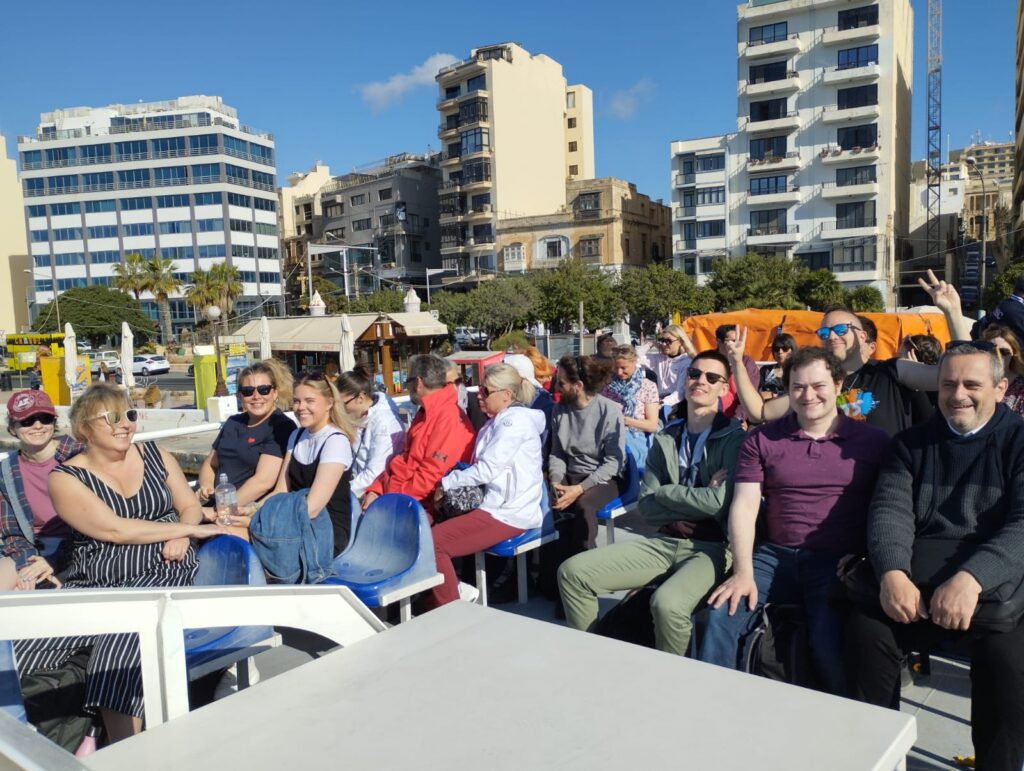
The first morning started off with a stunning ferry ride across the port from Sliema to Valletta, what a way to arrive at our office for the day in the Valletta Design Cluster. Momentum and Roscommon Leadership Partnership kicked off the meeting with a project management workshop and the partners spoke in detail about the ACORN Work Packages (stay tuned for these as we release them). The primary focus of the meeting was learning and exchange, so we swapped information surrounding the strengths and weaknesses for each country’s youth.
VisMetNet had then organised a wine and Hyperlocal olive oil tasting at Tan Nixxiegha Olive Grove in Bingemma with Christian from Merill Rural Network. The wine was made with grapes produced from vines that grow on the local farm, which are pressed and bottled on site. It was a fascinating look into a rural business. Tan Nixxiegha Olive Grove was founded in 2000, when brothers Charlie and Raymond, acquired a patch of land for the cultivation of olive trees in Binġemma.
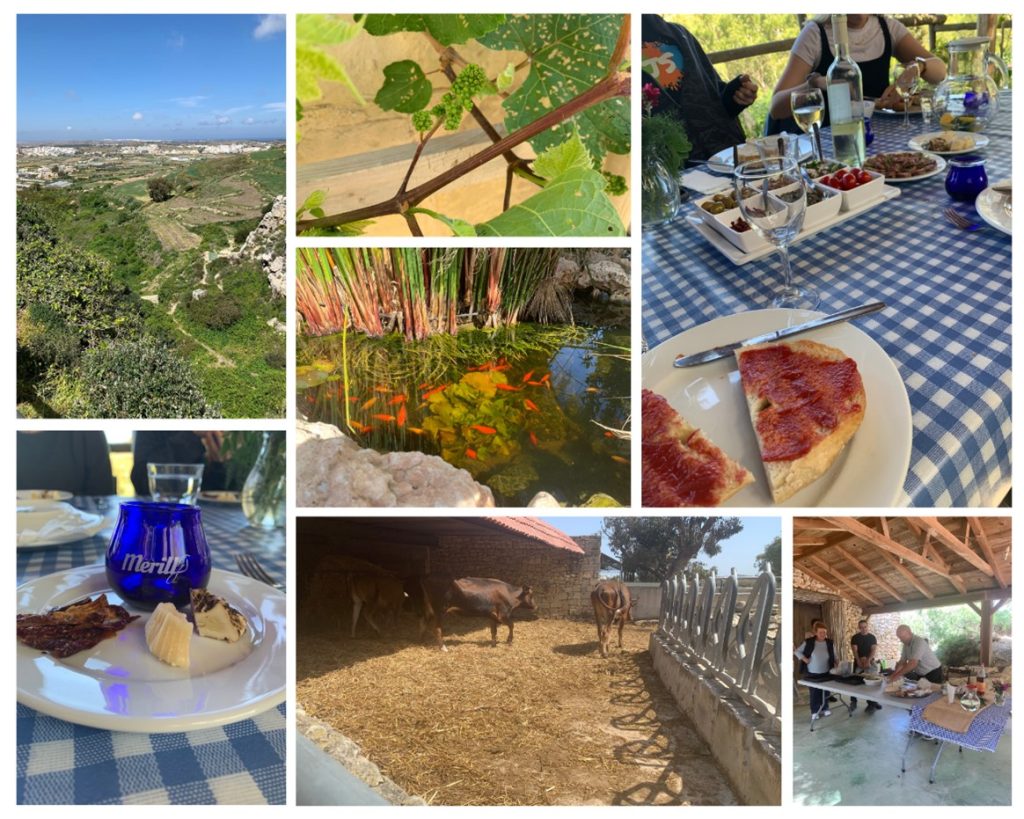
We enjoyed sampling locally made bread with gorgeous toppings, including capers, olives, hummus, and sheep’s cheese. The sheep’s cheese was made three days before the tasting. Charlie gave us a guided tour of the grove and told us more about the variety of fruit and flower that they grow there. We also learned about the native Maltese Black Hen, they are a rustic breed that are raised both for eggs and meat on local farms.
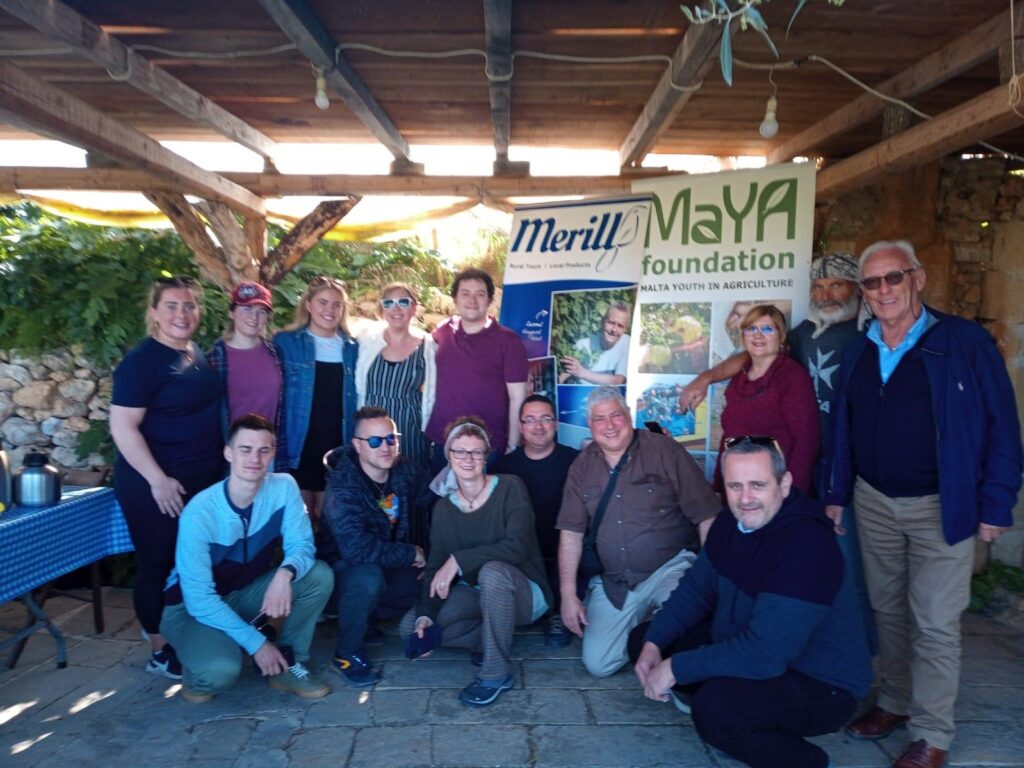
On our second day of the Meeting, we were taken to the Centre for Agriculture, Aquatics and Animal Sciences also known as MCAST in Qormi, where we learned all about agriculture in Malta. Some of the many facts that were learned were that the Maltese government have financial support in the form of grants for the youth of Malta to help them to start farming, though the cost of land far outweighs the benefits of grants available to the Maltese youth. Interestingly, all animals have to be housed inside all year round due to the ground levels being very high in nitrates.
VisMedNet had organised a Pastizzi Hands-On Workshop for lunch. We watched a demonstration and then we all got to make our own Pastizzi, which is a traditional savoury pastry. After our lunch they had organised for a local Francesco who is a musician and Traditional Instrument maker to play some of the traditional instruments for us.
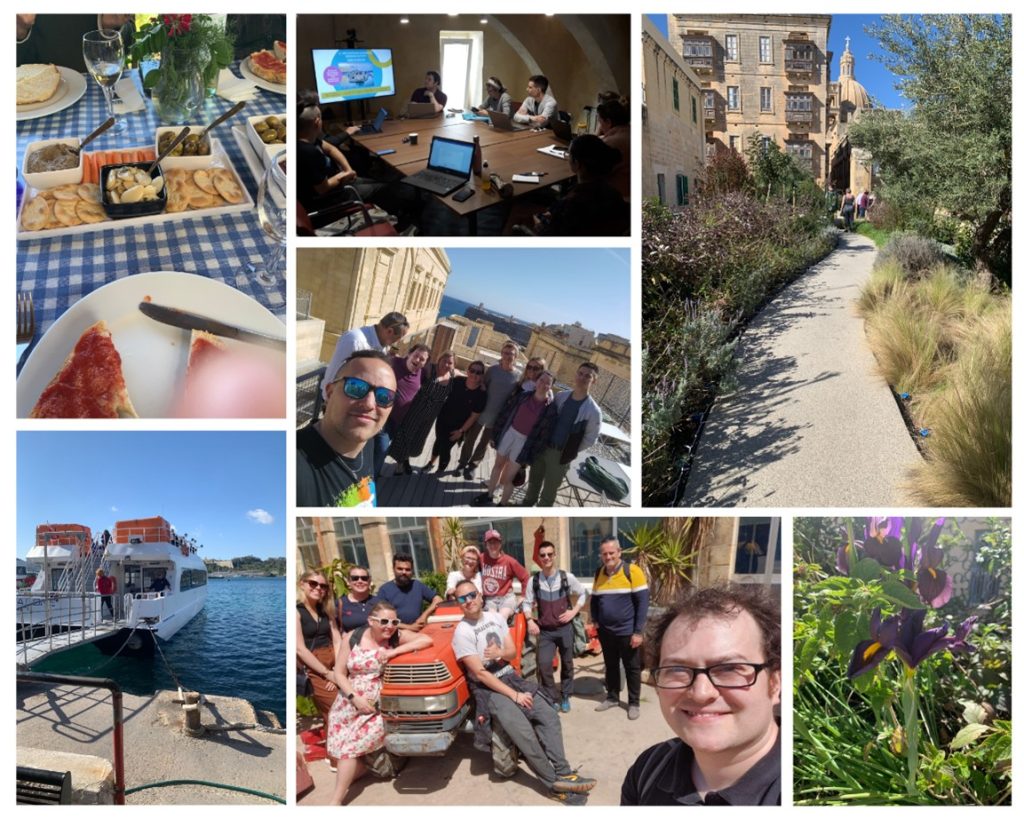
We loved our visit to Malta and we are very grateful to VisMedNet for this wonderful experience, we came away inspired for our work on the ACORN Project.
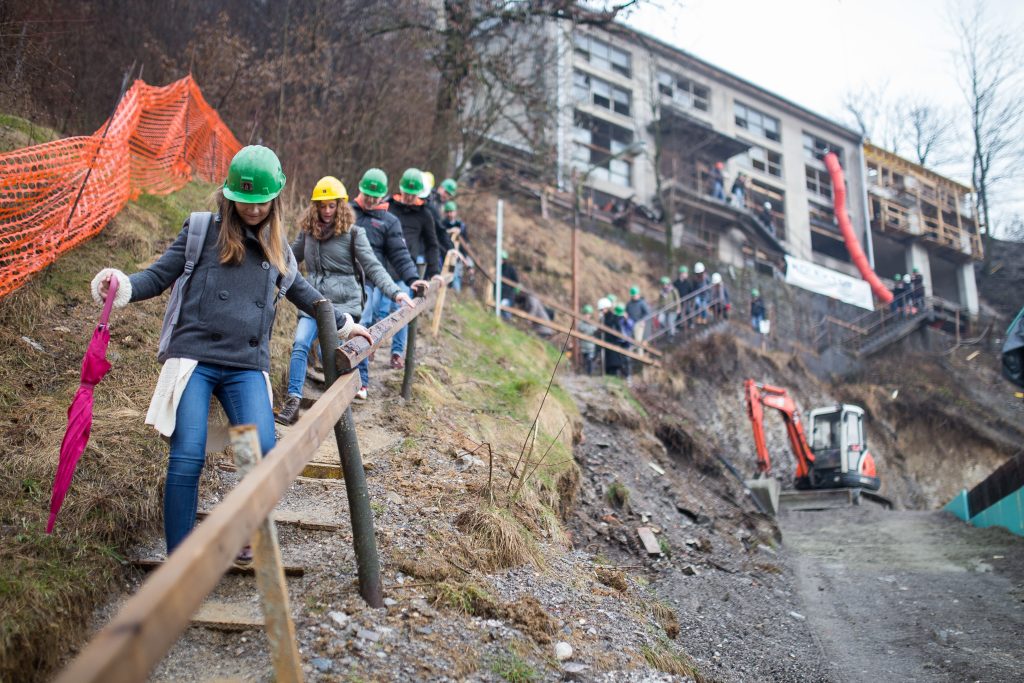
Welcome to a world where heritage meets innovation, where the past and future intertwine to create something truly remarkable. This is the vision of the ID20 Institute, a pioneering organisation nestled in the heart of Idrija, Slovenia. With its rich history as a former global mercury mining powerhouse and its status as a UNESCO World Heritage Site, Idrija provides the perfect backdrop for the groundbreaking work of the ID20 Institute.
The drive to push the boundaries of heritage innovation led a group of dynamic young entrepreneurs and enthusiasts to establish the ID20 Institute. Their mission? To fuse the rich tapestry of Idrija's heritage with cutting-edge technology, fostering groundbreaking advancements in business, service, and creativity sectors.
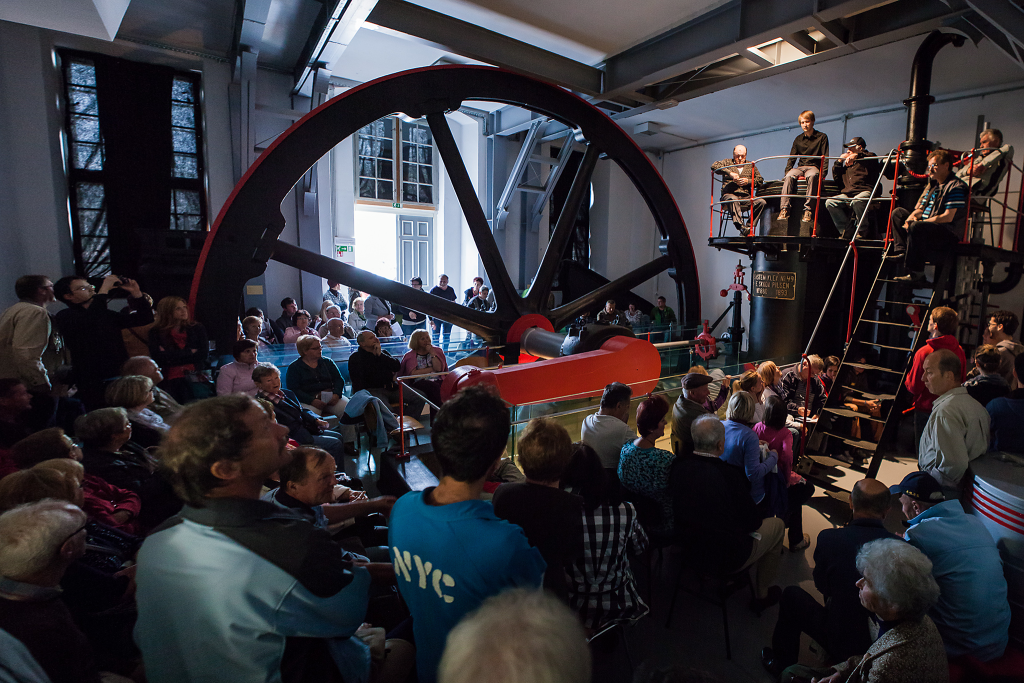
Professionalism at Its Core
Personalised Project Management
The Power of Collaboration
Unwavering Commitment
The roots of ID20 lie in the Idrija 2020 Association, which brings together over 40 young activists and supporters. Since its inception in 2012, the association has been a catalyst for youth development, focusing on areas like local strategic development, entrepreneurship, and heritage revitalisation. Its ultimate goal is to transform Idrija into a youth-friendly municipality.
With the founding of the ID20 Institute, the association extends its reach, dedicating resources to research, promote, and support the next level of cultural heritage innovation.
The ID20 Institute stands at the forefront of blending heritage with innovation, charting a new course for Idrija and beyond. Whether you're a professional, entrepreneur, or enthusiast in the realms of heritage, business, or creative sectors, we invite you to join us in this exciting journey. Together, we can take heritage innovation to new height.
Click HERE to find our more!
ACORN is a two year project funded through the Erasmus+ Programme. Activating Young Rural Development (ACORN) is a landmark project for European Year of Youth 2022 which will develop a new suite of resources including a transferable mechanism for youth inclusive rural development in Europe. Championed by partners in four European regions during the lifetime of the project.
We had our young people participate with a survey through the ACORN Project. The main objective of the survey was to explore the issues and opportunities of youth engagement in rural development and uncover best practices, which will hopefully engage, empower and inspire rural young people to become active citizens, co-creators and implementers of rural development initiatives.


On the 6th of April 2023, Roscommon Leader Partnership (RLP) had their suck valley way conference. Mark Dolan, Olivia Dunn and Katie Cronin spoke on a panel where the discussed their experiences in the National Rural Youth assembly and ACORN Erasmus+ project they have recently participated in along with their view of being a young person living in Rural Ireland.
Mark, Olivia and Katie are actively participating with local community development groups to further the progression of their community while also assisting in line with the ACORN Erasmus+ Project and with the local and economic plan with LEADER. In line with the Rural Futures policy these young people are making strides along with their peers in youth participation.
During the conference they answered questions directed to them but they also had an open floor discussion. It was an opportunity for the young people to be heard and give their feedback on advancements which they felt needed to be overcome to make rural areas more attractive for young people to live and work.

On Thursday the 11th of May we had the pleasure of having Minister Humphreys officially open up The Cube Flexi Space building in Roscommon town. She got to visit multiple projects that Roscommon Leader Partnership had to offer. This included our Erasmus+ Project ACORN, where we showcased what it had to offer and how we incorporated our young people into it.
During Minister Humphreys visit to The Cube Flexi Space, she got to visit over a dozen community groups and enterprises who work within the centre. This visit provided a chance to highlight the dedication of workers, board members, and volunteers who all contribute significantly to the growth and wellbeing of their local communities. Furthermore Minister Humphreys, opened up The Phoenix Youth and Community Hub in Ballaghaderreen, and The Digital Hub in Ballinlough.

The ACORN Erasmus+ Project will run until September 2024. More details about the project are available on the project website. https://acornproject.eu/about/.
About Roscommon Leader Partnership:
Roscommon Leader Partnership seeks to champion needs responsive, local yet outward looking development initiatives which focus on improving the quality of life in Co. Roscommon for all. We provide practical and needed supports including grants, training, work placement and advice to community and voluntary groups, social inclusion target groups, small businesses, farm families and businesses and potential entrepreneurs. We also collaborate with a wide range of local organisations in the delivery of our services.